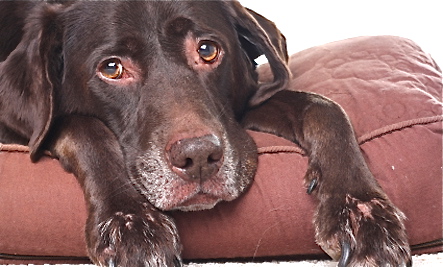1. Evidence of Pain
Limping or other evidence of pain while your animal companion is walking, running, or jumping is mostly associated with arthritic issues or joint or muscle diseases, but it can also be a sign of cancer (especially cancer of the bone).
2. Changes in Bathroom Habits
Changes in your animal companion’s urinary or bowel habits – difficulty using the bathroom, frequent bathroom use, blood in urine or stool – these are all potential signs of cancer.
3. Lethargy or Depression
If you notice your animal companion is not acting like himself or herself – sleeping more, less playful, less willing to go on walks or to exercise – this can also be a sign of cancer. Once again, lethargy or depression is not a symptom confined to cancer, but an accumulation of any of these signs is reason enough to speak with your companion’s veterinarian.
4. Coughing or Difficulty Breathing
Coughing or abnormal breathing can be caused by heart disease, lung disease, and also cancer. Cancer can metastasize through the lungs and cause these symptoms.
5. Change in Appetite
Dogs and cats do not stop eating without a cause. While a lack of appetite does not automatically indicate cancer, it is still something to be discussed with your veterinarian. Oral tumours can also cause difficulty or pain when eating or swallowing.
6. Weight Loss
Cancer is among the list of diseases that can cause weight loss in your animal companion. If you notice sudden weight loss in your canine or feline companion (and it is not currently on a diet), along with other signs from this list, be sure to mention it to your veterinarian.
7. Non-Healing Wounds
If your animal companion has wounds or sores that are not healing, it could be a sign of infection, skin disease, or even cancer.
8. Abnormal Discharges
Blood, pus, vomiting, diarrhoea, or any other abnormal substance being discharged from any part of your animal companion’s body should be checked out by your veterinarian. In addition to that, if your canine or feline companion’s abdomen becomes bloated or distended it could be a sign of an accumulation of abnormal discharge within the body.
9. Abnormal Odors
Offensive odours from your animal companions mouth, ears, or any other part of the body, should be checked out. Oftentimes cancers of the mouth, nose, or anal regions can cause such foul odours.
10. Lumps and Bumps
Not all lumps and bumps on or under your animal companion’s skin will be cancerous, but there is no way to know for sure without getting your veterinarian involved – this is especially important if the lump is not resolving itself or is growing in size. A needle biopsy is commonly done and a veterinary pathologist can let you know if the cells are cancerous or not.
Selected from PetMD




